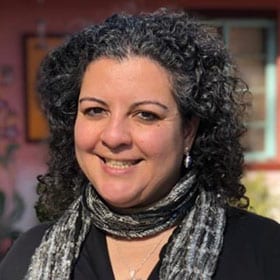Associate Professor of Psychiatry
University of Arizona College of Medicine – Tucson
FOCUS
Noshene has a passion for supporting others to find their voice, health, and a sense of fulfillment and community. As a young adult, she struggled with anxiety and depression, and found it difficult to access mental health support that was empowering or made sense to her culturally. At times, even medical school education added to her traumas and struggles. Now she is an advocate for a holistic, comprehensive, culturally-sensitive, empowering approach to mental health and well-being for others, especially Indigenous communities and immigrants/refugees/asylum seekers. As a leader in diversity, equity and inclusion, Noshene now works with American Indian youth and adults to address diverse challenges including the youth suicide epidemic and promoting resiliency in the face of historical, intergenerational, developmental, and complex trauma.
Knowing first hand the toll that secondary trauma can take for mental health and other caregiving professionals, Dr. Ranjbar leads trainings to prevent burnout and better sustain the care these caregivers provide to others. She educates and trains community members, leaders and professionals to see each child or adult as a whole person in mind-body-spiirit, with many skills and strengths.
As part of her vision for a culture of health, Noshene values a trauma-informed approach that helps professionals and community members learn about how trauma can impact all of us, and how to learn and practice being mindful of the way we can each help or hurt those we are serving. For example, each person’s tone, body language, and behavior can either help empower and inspire others who have faced traumas, or unintentionally add to their struggles. Safe spaces for authentic sharing and building healthy communication and emotion-regulation skills can make a significant positive impact.
STRATEGIC INITIATIVE: EARTH: Empowering All Relatives to Heal
We provide trauma-informed care through Mind-Body Skills Training for American Indian Communities in Arizona (and Beyond). I have had the honor of working with several American Indian communities over the past 11 years, offering trauma-informed capacity building through mind-body skills training of youth and adults. My strategic initiative will involve furthering these efforts within Arizona tribal communities and those serving this unique population. The train-the-trainer model through The Center for Mind-Body Medicine will be utilized to continue to train nurses, therapists, social workers, teachers,and students. These individuals will bring what they are learning and co-facilitate small groups for adults and children in their communities. Additionally, they will come together for focus groups and workshops to continue to brainstorm and expand their efforts through intra- and inter-tribal collaborations and networking. Cultural advisers and elders from represented tribal communities will continue to provide invaluable guidance, intention setting, prayer, and encouragement along every phase of this program. In order to sow the seeds, a planning grant was funded by The David and Lura Lovell Foundation for 2021 to begin these collaborations and trainings. The strategic initiative for this program will take place in 2022–2023, building on the seeds that have been sown through the efforts until then.
MORE ABOUT NOSHENE
Born and raised in Iran, Noshene Ranjbar now serves as Associate Professor of Psychiatry at the University of Arizona College of Medicine – Tucson, as well as Director for the Integrative Psychiatry Program. She is also fellowship faculty with the Andrew Weil Center for Integrative Medicine and faculty with The Center for Mind-Body Medicine. Originally from a culture that values community, she moved to one that was more individualistic and isolating, and learned to create community for her own personal and professional wellbeing. She believes in the power of community for everyone’s wellbeing, particularly those from marginalized identities. Noshene translates this into her work in integrative psychiatry, mental health caregiver well-being and burnout, mind-body medicine, and health disparities.
Click here to watch Noshene’s Legacy Project video.
NOSHENE’S WORK AND VISION
- #SameHere Psych
- An Integrative Approach to Mental Health – Interview with Dr. Noshene Ranjbar (SparkingWholeness.com)
- Dr. Noshene Ranjbar: on the Frontier of Integrative Psychiatry (Physician Thriving Podcast)
- Time to Prioritize Indigenous Youth: Mind, Body, Spirit, and Culture (College of Medicine – Tucson)
- Just remember EARTH: Simple ways to help kids through this uncertain time from a UA psychiatry professor (#ThisIsTucson)
- Mind-Body Medicine and Mental Health: The Unseen Needs of the Hour (Thrive Global)
- Covid-19: A doctor behind the poetry (Thrive Global)
- Pres. Trump’s Slur against American Indians (Scientific American)
- Mindfulness Has Parallels to Indigenous Cultural Practices (American Psychiatric Association)
- Collaborating to Address Trauma and Enhance Well-Being for Indigenous People (Lovell Foundation)
- Being with Breath (American Indian Youth Wellness Camp)
- Culturally Congruent Trauma Healing for American Indian Communities through Mind-Body Medicine
- “The Biggest Opportunity to Heal Our Planet” (Iran Wire)
- Trauma and Hope in Iran
- Zamin Podcast
- BBC Persian
- Psychiatrists’ Plea: End the Abuses in Iran (NY Times)
- Trauma’s Toll on Health: A Conversation with Dr. Noshene Ranjbar
- Iran & Farsi-Speaking Diaspora
- Let’s Get Psyched
- https://www.drnranjbar.com/

